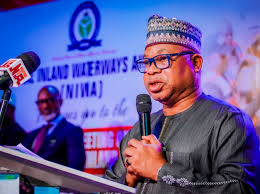A marine engineer, Mr Greg Ogbeifun, says it is 40 per cent more expensive to build a ship in Nigeria than outside the country.

Ogbeifun made the disclosure at a breakfast webinar meeting organised by Zoemaritime Resources Ltd., with the theme: “Ship Building and Ship Repairs, Tool for National Transformation”.
According to him, the statistics is from two foreign companies that came to Nigeria to set-up ship building company which was lacking in the country.
The marine engineer said that the country’s tax law was unfavourable to the maritime and
shipping industry also contributed.
“Government policies have not been too favourable to the maritime sector as a whole and the ship repair section of the industry is not exempted from that which has resulted to lack of infrastructure to ship building in the country.
“Due to the unfavourable tax laws, the country today is finding it difficult to develop a
global trading fleet whether privately or public owned or even a Public Private Partnership
(PPP),” he said.
Ogbeifun also noted that to tackle the challenge of ship building in the country, there was
need to amend the Cabotage Act which he described as a good idea from government but lacked implementation.
According to him, the challenge experienced was that one of the pillar of the Cabotage Act was that every vessel operating in Nigeria must be built in the country, but it also realized that the country does not have any ship building capacity, not even one.
He added that a waiver was incorporated in the Act whereby if anyone want to build a ship that would operate in Nigeria, would pay $1000 dollars to the Nigerian Maritime Administration and Safety Agency (NIMASA) to be authorized to build the ship outside Nigeria.
“The provision of the Act was such that within five years of enacting the Act, the country was expected either publicly or privately or through PPP to have established a ship building
capabilities but in all the years till today, that has not been the case.
“Being a ship repairer, I am also a ship owner and most of our ships are built outside the
country. Now I go to NIMASA to obtain a waiver and pay $1,000 dollars to build my ship outside the country.
“Now, what we found out is that NIMASA is only interested in collecting that $1,000 dollars
than focusing on establishing a ship building capabilities.
“What is even more ridiculous is that if you obtain a waiver to build a ship once, you expect
that after building that ship the issue of waiver should cease but that is not the case. We
built our first ship in 2010 and every year we pay the $1,000 dollar waiver for the same
ship,” he said.
Ogbeifun also said that a committee was established to ensure the country had a national fleet for close to four years, adding that it had not happened due to the industry not having tax incentives which obtains in other countries.
He said that the lack of such incentives including zero import duty, tax holidays, which
should be given due to the fact that the business was capital intensive, made Nigeria not to
compete favourably with other countries.
The marine engineer said that one of the current issues affecting its organisation and other
shipyards operating in Onne, Rivers, that needed the Nigerian Ports Authority intervention was the $6,000 per passage in and out for ship on repairs or commercial purpose.
“This adds to the cost of doing business and that alone has become a disincentives for
people,” he said.
He said that the future would see the organisation expanding to having a shipyard that would accomodate a ship building capability for ships and had the lifting capacity of 7,500 tons from its present 5,000 capacity, and a length of 120meters from 44meters.
“On my 70th birthday, the Federal Government through the ministry of transportation gifted me with a 21-year lease to actualise this and when done, it will be a source of employment for people.
“This will ensure that the era of taking ships to other countries for dry docking will be
over,”Ogbeifun said
















Discussion about this post